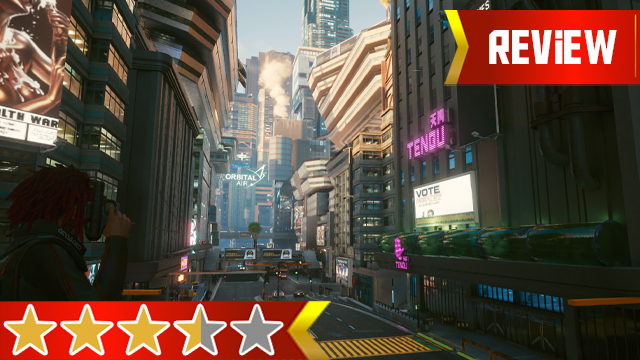Cyberpunk 2077 review for PC.
Cyberpunk 2077 is not what CD Projekt Red wanted it to be. Never before has a game so clearly defined the over-ambitiousness of the gaming industry, with it so laboriously stuffed with content that it’s quite literally bursting at the seams. Everywhere you look in Night City there’s evidence of a project gone awry, from the mountain of glitches and performance issues, through to poorly implemented features like crafting and leveling. It is a game where you can read a log entry about a company working its staff to the bone for little reward, then hop onto a motorcycle that causes your player-character, V, to T-pose with their pants off.
Cyberpunk 2077 has been released, but it’s not yet ready to be played. Even on PC, which is the version of the game being reviewed here and is superior to the disastrous PS4 and Xbox One versions in every way, it’s clear that it is unfinished. My first steps in Night City were not spent admiring its towering skyscrapers or bustling streets, but rather excessively tinkering with the settings to get it to run adequately.
Even after working to achieve serviceable performance on an RTX 2070 Super, various inexplicable issues would routinely arise to remind me of its troubled development. My health meter would suddenly stop working, the mini-map would send me in the wrong direction, or an important boss fight would be brought to a halt by said boss becoming stuck in thin air. While I never experienced a hard crash or game-breaking bugs during my playtime and all of the more egregious bugs resolved themselves in time, it was impossible to be feel immersed in its world when so much was breaking around me.
Night InauthentiCity
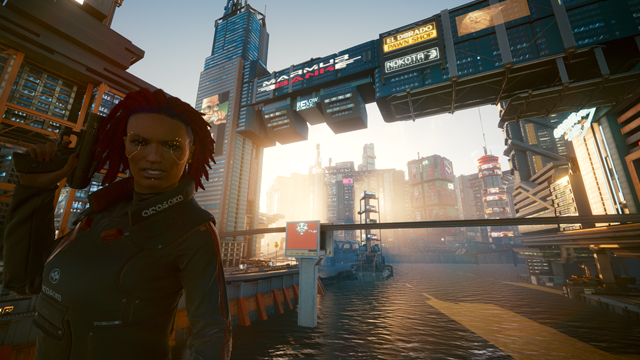
Rarely has a game been so at odds with its setting as Cyberpunk 2077 is with its story of rebellion in a capitalist dystopia. With the context of CD Projekt Red’s widely-reported crunching practices, its anti-corporate message feels inauthentic. It is as punk as John Lydon doing a butter commercial. Though we’re often asked to “separate art from the artist,” it is difficult to believe in Cyberpunk‘s message when it is so at odds with what’s been reported about its development cycle.
This inauthenticity stretches to the customization options offered to you, which struggle to let you become one of Night City’s enhancement-obsessed populace. You’re locked into one of just two body types and gender options from the outset, a smattering of cosmetic-only cybernetic enhancements, and appearance choices that won’t make your V look too different from everyone else’s. Considering that the game’s marketing informs would-be players that ‘Night City Changes Every Body,’ you can’t even get a haircut. Aside from your clothing, your V will look the same at the start of the game as they do at the end, but you can choose between two penises so at least there’s that.
You’re asked to choose a Lifepath, a seemingly major choice that I figured would have a big impact on the rest of the game. Out of Nomad, Streetkid, and Corpo, I opted for the latter, assuming that being directly involved in Night City’s seedy corporations would allow me to experience a riches-to-rags story and see both sides of the coin. Instead, a brief prologue led to a montage summarizing six months of important story detail, as my Corpo background became nothing more than the occasional ineffectual dialog option.
There’s a classic in here, somewhere

So much of Cyberpunk 2077 feels like the beginnings of a great idea left by the wayside to meet an arbitrary deadline. Its leveling system is intricately detailed, allowing you to increase individual core stats like Body, Reflexes, and Cool, and then dive in deeper with perk points that let you tweak V as you see fit. However, points are handed out sparingly, and the stats mostly feel inconsequential given that they only add marginal improvements to your character. Crafting is also a glaring oversight, with you able to upgrade each gun, equip fun mods, or even make new weapons from scratch, but then it’s in no way vital outside of occasionally needing to craft ammo.
Considering the lengthy period of time between its announcement and release, the whole experience bleeds disappointment. This is made even more frustrating by the multiple signs that a great game is to be found in the wreckage. Not just a great game, in fact, but a terrific one — when the stars align and Cyberpunk 2077 works as intended, there’s nothing else quite like it, and it’s all thanks to Night City.
A bit on the side
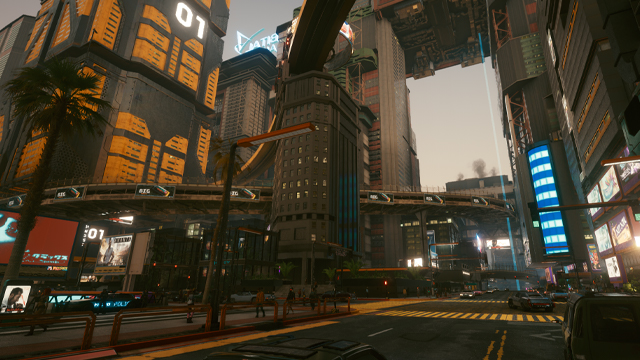
Night City isn’t your typical sprawling-yet-barren game world where you do little more than travel between objectives — there are always secrets to unearth if you take the time to stop and smell the oil-covered roses. Taking a seat at a diner could result in you being caught up in an impromptu robbery, while going for a stroll beneath the freeway can end up in a guided meditation session with a mysterious Buddhist. Night City is so much more than just nice scenery you can stop to stare at between waypoints, and my curiosity was always rewarded.
When at its best, Cyberpunk 2077 had me naturally finding myself at the center of unexpected chaos. In one brief period of time, I was tasked with trying to calm an uneasy AI taxi cab that had gone rogue, before I stumbled upon a mini-boss fight with a crazed construction worker who had been fitted into a giant exosuit. Then I traveled north, to nowhere in particular, and found the mountains of imposing oil rigs that fuel the beautiful, dangerous city V lives in. It is these moments that make Night City feel alive.
However, despite building the most impressive open-world I’ve yet seen in a game, I was inexplicably encouraged to rush through Cyberpunk 2077‘s main story arc and overlook it all. By introducing a plot device that essentially makes V a ticking time bomb, I felt compelled to push through my main jobs and leave my side jobs behind. This is unfortunate, as while the main story is what drives the plot forward, the side jobs are what reveal the beating heart at the center of Night City.
Side jobs will mostly see you working with characters you’re hurriedly introduced to in the main story. Not only do they help to give much-needed context to the overarching plot, but they also provide interesting stories in their own right. It’s reminiscent of Fallout: New Vegas, albeit with less player choice, where you take a detour from the main quest to embark on a winding adventure filled with surprises and colorful characters.
Cyberwhere?
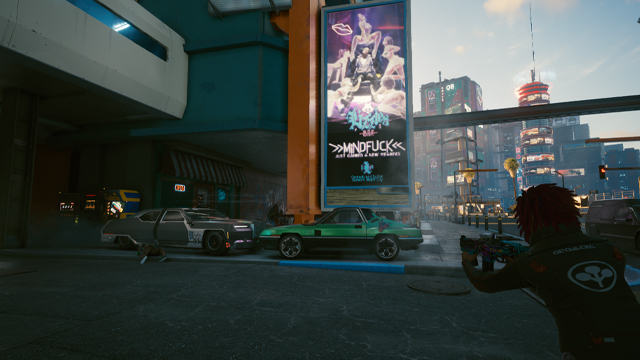
The voice acting is almost universally excellent. V, portrayed by Cherami Leigh or Gavin Drea depending on whether you’ve opted for a female or male player-character, is the right mix of sympathetic and intimidating, keeping me locked in tight to the story even when the dialogue leaned a little too heavily into sci-fi convolution. Keanu Reeves, who surprisingly features heavily in the game, gets the worst deal when it comes to this. His character, the narcissistic rocker-turned-terrorist Johnny Silverhand, is forced to say more than a few lines that made me think of Harrison Ford’s comments on the Star Wars script: “You can type this shit, but you can’t say it.”
While Reeves’ performance can be hit-and-miss — the Hollywood actor isn’t exactly known for his impressive range and it shows here — the rest of the cast help make Night City’s interweaving stories memorable. These side jobs also provide the player with the most choice, allowing you to make crucial decisions that are rarely presented to you in the main story.
This is why the sense of urgency imparted on the player is so baffling. It’s fitting that Cyberpunk 2077 is based on Mike Pondsmith’s tabletop role-playing game of the same name, as it often felt like I was locked in a session with an impatient DM. Amid an ongoing information dump of names, locations, and objectives in Cyberpunk‘s prologue, I was hurriedly whisked through parts of the game I’d later learn were integral to my enjoyment of it.
The most egregious example of this is cyberware. This is hastily revealed at the start of the game before becoming just another marker on the obscenely overstuffed map, yet unlocking new cybernetics to attach to V significantly improves its gunplay. Not only that, but the most fun cybernetics cost huge sums of money that can’t be obtained in any timely fashion. As gunfighting can be a chore, with weapons feeling clunky to handle while enemy AI is inconsistent, cyberware can dramatically increase the player’s enjoyment of it. So why is it so difficult to get?
Cyberpunk 2077 Review | The final verdict
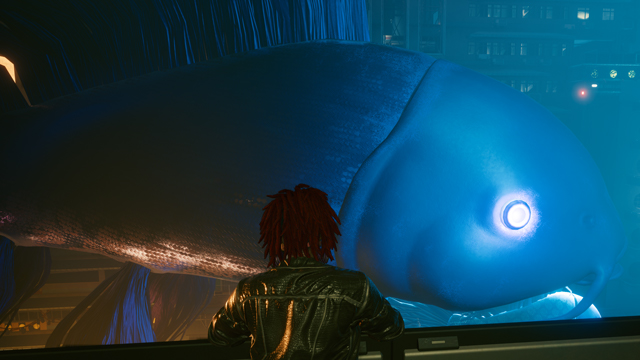
And that feels like Cyberpunk 2077 in a nutshell — a truly excellent game hidden beneath layers of poor choices. There’s so much here to love, yet between the copious bugs, performance issues, and it ushering the player away from its very best features, it gets lost in the rubble.
When played on PC, Cyberpunk 2077 is still an impressive, engrossing, and fun RPG despite its flaws. However, assuming that CD Projekt Red sticks to its word and fixes its problems, it has all the potential to be a genuine classic of its genre. As such, it’s difficult to recommend playing it at its worst, when its best could be something special.
Cyberpunk 2077 reviewed on PC. Code provided by publisher.
-
A genuinely great game hidden beneath the copious problems.
-
A bustling, technically ground-breaking open-world filled with mystery.
-
Cyberware is game-changing...
-
...but like a lot of cool stuff, it's expensive and time-consuming to get.
-
Tons of bugs, glitches, and performance issues.
-
Main story tells you it needs to be completed urgently, when you should be doing anything but.
